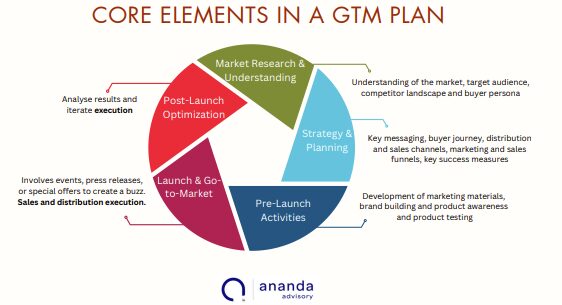Founders invest considerable time in developing their products or services. However, an often overlooked process is the Go-to-Market (GTM) strategy which is a road map that allows you to think through all the necessary steps to get your product or service to market. It is a road map that will help you avoid pitfalls and increase your chances of success as it outlines how to launch and sell products or services to your target market.
GTM serves as a critical element for success, providing a clear direction for achieving product-market fit and securing a sustainable competitive advantage.
A solid GTM strategy also assists in raising capital, as investors want to see that you have a clear plan for how you will achieve your desired results. From my experience, a well-defined and thought out GTM is critical for business success as it allows alignment to a successful launch. I often refer to it as “lining up your ducks” for ultimate success.
Often marketing strategy and GTM are used interchangeably. However, these are two distinct activities.
Marketing Strategy is the Big Picture: It outlines your overall marketing goals and how you’ll achieve them over a long period. This encompasses brand building, customer acquisition, and retention across all products and services.
GTM Targets the Specific: It focuses on launching a new product or service into the market. It leverages the marketing strategy’s foundation but drills down on how to reach the target audience for a specific offering.
A ROBUST GTM STRATEGY IS CRITICAL AS IT:
- Ensures that a startup’s limited resources are directed towards the most impactful marketing and sales channels.
- Identifies potential challenges and gaps early on, and helps startups mitigate risks associated with product launches.
- Provides a framework for making data-driven decisions throughout the product launch process.
HOW A GTM STRATEGY ASSISTS
- Validates product-market fit: By testing core assumptions about the target market early on, a GTM strategy helps ensure the product resonates with the intended audience.
- Secures Funding: A well-defined GTM strategy strengthens a startup’s pitch to investors by demonstrating a clear path to market success.
- Accelerates growth: A GTM strategy provides a framework for scaling the business and reaching a wider customer base.
SEGMENTATION & BEACHHEAD STRATEGY
An area where business should spend more time is segmenting the market. Segmentation and beachhead strategy are fundamental concepts in the GTM process for navigating the gulf between early adopters and mainstream markets. In other words, developing a beachhead strategy and identifying early adopters are crucial in ensuring that your new product or service has the foundations for scaling up. By adopting a segmentation approach, a start up can focus its resources on those customers that can provide early wins.
Segmentation is crucial because early adopters and mainstream markets have fundamentally distinct characteristics. Early adopters are enthusiasts who embrace novelty, while mainstream markets prioritize practicality and proven solutions. By segmenting the market, startups can tailor their messaging and product offerings to resonate with each group.
Beachhead strategy builds on segmentation and allows startups to concentrate resources, gain early wins, and establish a strong foothold before expanding to broader markets.
Segmentation and beachhead strategy provides a focused roadmap for startups to bridge the chasm and achieve sustainable success in the mainstream market.
By investing time and resources into crafting a robust GTM strategy, as well as having a clear segmentation and beachhead strategy, startups can significantly increase their chances of achieving long-term success.
About the Author
Prem Chand is Principal and Managing Director at Ananda Advisory, a boutique advisory firm that provides bespoke services to businesses at all stages of the business cycle in growth, value creation, commercialisation, go to market and market expansion. He is a director of Hunter iF Limited and Chairperson of Hunter Angels Limited.

